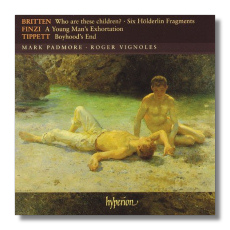
The Internet's Premier Classical Music Source
Related Links
- Latest Reviews
- More Reviews
-
By Composer
-
Collections
DVD & Blu-ray
Books
Concert Reviews
Articles/Interviews
Software
Audio
Search Amazon
Recommended Links
Site News
 CD Review
CD Review
20th Century British Song Cycles

- Benjamin Britten:
- Who are these Children?, Op. 84
- 6 Hölderlin-Fragmente
- Um Mitternacht
- Michael Tippett: Boyhood's end
- Gerald Finzi: A Young Man's Exhortation, Op. 14
Mark Padmore, tenor
Roger Vignoles, piano
Hyperion CDA67459 78m DDD
An intriguing and enthralling disc encompassing some off the beaten track repertoire, which I must admit is completely new to me. Still, listening to these songs proved to be a compelling and riveting experience. The main theme of these cycles is 'youth', but following the texts, one discovers that the real parallel is the 'passing of time'.
The disc opens with Tippett's 'Boyhood's End'. In 1943, the composer was commissioned to write a piece for the return of Britten and Peter Pears from America. Tippett chose W.H. Auden's autobiography 'Far away and long ago' as his prose setting, and he cast the work in the form of a Purcell cantata. The dedicatees premièred the work in 1945.
Boyhood's end is a short but dramatic work full of conflicting emotions and nostalgia for days of yore. Gerald Finzi's 'a Young Man's Exhortation' is the second item on this exquisite menu with settings of poems by Thomas Hardy. Although Finzi may seem modest compared to the strong musical personalities of Tippett and Britten, in this cycle he scales the heights of the greatest song composers, particularly Schumann and Wolff. Finzi also felt a strong emotional affinity with Hardy's work and this factor was vital in the composition of this cycle.
Composed in 1933, 'A Young Man's Exhortation' contains some of Finzi's most beautiful lyrical writing for the voice, in this case a tenor and his skilful use of the upper registry to underline key words and sentiments is superb. Benjamin Britten's 'Who are these children' is a compilation of 8 Scots and 4 English poems by William Soutar. Although Britten was fascinated by the double perspective of children's innocence and adult consciousness, he kept this cycle within the childhood framework imposing a work that is both delicate and disturbing.
Friedrich Hölderlin is today regarded as one of the greatest lyric poets in the German tongue. But in his day he was unjustly neglected, dying insane and discarded in 1843 aged 73. The 6 Hölderlin songs that Britten composed are very rare in his output, as he keeps the vernacular. Although the songs possess some beautiful and stirring poetry, their musical austerity seems to have deterred performers from interpreting, subsequently considered as something of a Britten rarity.
'Um Mitternacht' is Britten's only setting of a poem by Goethe. Some evidence indicates that the composer was planning a whole Goethe cycle, but he only succeeded in writing this one song. Composed in 1959-60, it only emerged in 1994 as part of the cycle; 'The Red Cockatoo and other songs' published that same year. Although it is a short work it is considered to be a very radical and at times, experimental composition, in which the singer seems to walk suspended between earth and sky.
Roger Vignoles imbues the piano accompaniment with life and sensitivity while tenor Mark Padmore interprets this difficult repertoire with ardour and conviction. A memorable five-star recital with scholarly annotation to cap a marvellous Hyperion disc.
Copyright © 2005, Gerald Fenech



















